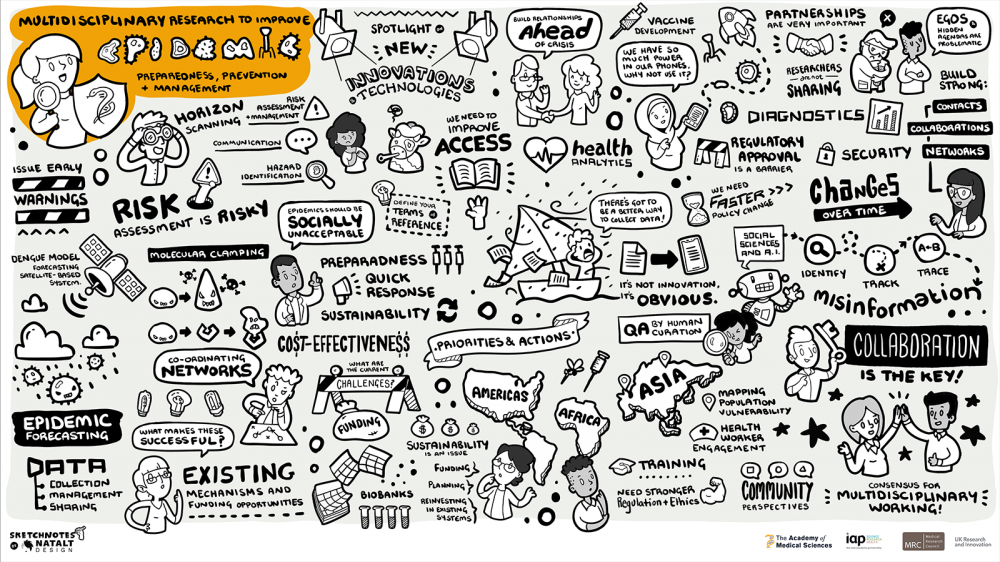We are delighted to publish our report “Interdisciplinary research in epidemic preparedness and response”, from our workshop with the InterAcademy Partnership and the Medical Research Council in October 2019.
Today [21 February 2020] the Academy of Medical Sciences, the InterAcademy Partnership and the Medical Research Council, together launch a workshop report on interdisciplinary research in epidemic preparedness, a topic of high relevance as the world watches the outbreak of the novel coronavirus unfold. We asked Professor Jimmy Whitworth FMedSci, Chair of this new report, to answer four key questions about the key messages which came out of the workshop*.
1. In your opinion, what are the most important points from the report?
Infectious disease outbreaks are unfortunately inevitable. But we can reduce the impact of epidemics by making sure we are prepared to respond, nationally and globally. To do this we must learn from what happens when an epidemic is taking place, as well as just before it takes hold and after it has died down.
A coordinated regional and global response can extinguish a new outbreak quickly, limiting impact and spread of the disease. While we have got better at responding to outbreaks, further investment and focus is needed to improve how prepared we are to respond to future disease outbreaks.
Research has a key role to play in both being prepared and responding to outbreaks. Given the diversity of biological, social, cultural and environmental factors affecting the spread of infections many areas of research – including biomedical, social and environmental sciences – have important contributions to make. This is why our workshop focused on the need for interdisciplinary research in epidemic preparedness and response.
To give just one example, people’s attitudes and behaviours influence the way a disease passes from one person to another, so researchers studying how a virus is transmitted must work alongside behavioural and social scientists to find new ways to stop spread of disease.
2. How is the report relevant to the current outbreak of novel coronavirus?
The outbreak of novel coronavirus demonstrates the complex nature of the response needed to tackle a new infectious disease outbreak. A multitude of research disciplines are needed to understand the disease quickly enough to stop it spreading and treat those with the infection. Right now, researchers from across the globe are studying the origin of the outbreak, its spread, the progression of the virus and effective intervention. Researchers and healthcare professionals must work together to learn from the novel coronavirus outbreak and make sure that any data published about it is accessible to all. The overall response, and any policies created, must be based on evidence and the government and chief health officials need to work hard to prevent causing fear whilst effectively preventing the spread of disease.
3. What would you like to see happen as a result of this project?
The future of global health security relies on a greater emphasis from funders and policymakers being placed on epidemic preparedness, particularly on the need for more interdisciplinary research. Scientists from across the world need to work together, crossing the typical boundaries of their specific subject area, to understand the full range of physiological, cultural, environmental and socioeconomic factors affecting infectious disease emergence and transmission. Researchers must also come together to develop and evaluate effective interventions, risk assessment models and to compare the impact of different intervention strategies.
It is only if we are able to work effectively in this way that we will be able to effectively inform and evaluate national and global preparedness plans, so that the world is ready to respond to the next emerging disease.
I hope to see the more multidisciplinary research partnerships and networks form and grow, and I urge scientists to engage the community to build trust and gather information. We must continue to build and support the ability for countries to carry out research so that every country is ready to respond to a disease outbreak, looking after patients and the public in the most effective ways.
4. How did this project come about?
During the 21st century, the world has experienced multiple epidemics of Ebola, Zika, yellow fever, Lassa fever, Nipah virus and many other infectious diseases. Not only do these have devastating effects on people and patients, but epidemics cause huge social disruption and have enormous economic consequences for affected countries. An increase in global mobility, population density and climate change are all contributing to the rise of epidemics and despite efforts to introduce regulations and establish networks, to improve global preparedness, the world is still considered at risk to new disease outbreaks.[1]
Given the complex interactions between microbes, people, animals and ecosystems, this research is going to have to be multidisciplinary and cross traditional disciplinary barriers to improve global preparedness. This is a tricky thing for research that so often stays within tidy areas of expertise, but for global health security we need to work differently.
To address this need for multi- and interdisciplinary research, the Academy of Medical Sciences (AMS), the InterAcademy Partnership (IAP) and the Medical Research Council (MRC) convened a two-day workshop in London in October 2019 to discuss the opportunities and barriers and how we can address these.
*‘Interdisciplinary research in epidemic preparedness and response’ is the report of a two day meeting on epidemic preparedness held in October 2019 funded by the AMS’s Global Challenges Research Fund policy programme from the Department of Business, Energy and Industrial Strategy, and by the Medical Research Council (MRC).
The meeting was held in partnership with the MRC and the InterAcademy Partnership.

[1] Global Preparedness Monitoring Board (2019) A World at Risk: Annual Report on global preparedness for health emergencies. Available at https://apps.who.int/gpmb/annual_report.html
